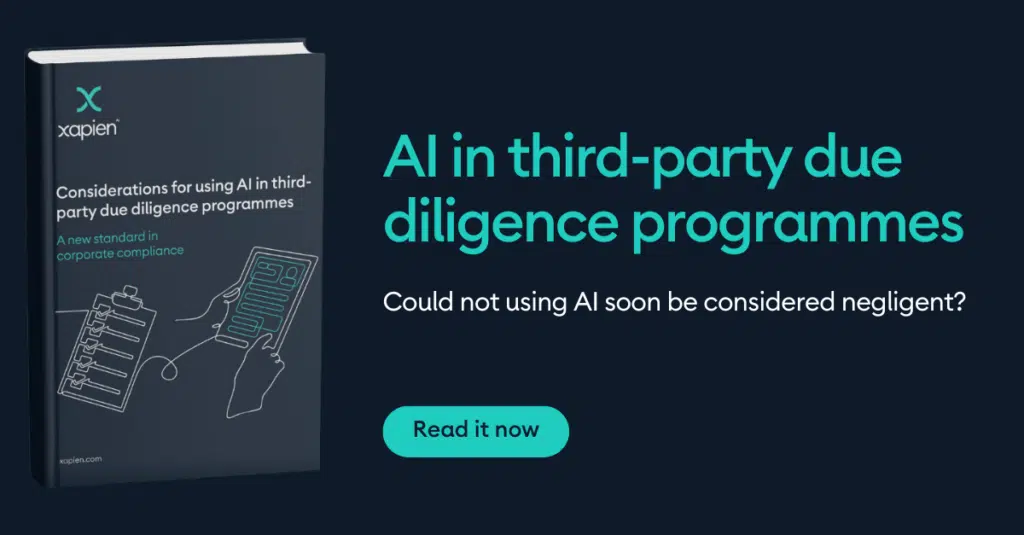
Third party due diligence:
The role of AI in a modern third-party due diligence process

In today’s fast-evolving business landscape, companies face increased demands for transparency, regulatory compliance, and risk management. The explosion of publicly available data, growing global instability, and the rise of the conscientious consumer create new challenges for organisations worldwide. In response, AI technology is emerging as a transformational solution to the third-party due diligence process and helping businesses better manage third-party risks.
AI benefits in third-party due diligence
Businesses operating internationally face the challenge of increasing transparency demands, unstable regulation, and a surge in online information about third parties. These factors require organisations to navigate complex compliance requirements and apply the appropriate risk-based measures. Gathering data from various sources, analysing the findings for risks, and summarising findings in a due diligence report—all these tasks to mitigate those challenges require substantial time and effort.
AI technology automates many of these labour-intensive tasks, such as data collection, risk assessment, and report writing. This automation not only saves organisations substantial time and money but also streamlines processes that could previously take weeks or even months, enabling faster onboarding. By helping teams sift through vast amounts of information about third parties, they can make more informed, risk-based decisions about working with their business counterparts. This transforms the traditional process of understanding third parties from a question of “Can we?” to “Should we?”
Looking behind the uptick in AI adoption
Over the past 12 months, companies have become more comfortable with AI and are beginning to see it as a valuable tool that has multiple advantages within a third-party due diligence framework. Compliance teams are constantly seeking faster, more cost-effective, and scalable solutions. AI delivers by providing these teams with deeper, more nuanced insights, not just into regulatory risks but also reputational risks.
This kind of advanced due diligence enables more strategic decision-making, helping companies decide not only who they can do business with but also who they should do business with. AI also lowers the thresholds for conducting deep due diligence, allowing companies to carry out assessments much earlier in the decision-making process.
AI best practices for third-party due diligence
For companies looking to incorporate AI into their risk management processes, they must work with trusted technology providers who are transparent about how their systems operate. There’s also the importance of human-AI collaboration. AI is excellent for performing repetitive tasks and heavy lifting; however, humans must remain at the centre of decision-making, applying nuance and judgment where necessary. Implementing a broad, all-encompassing AI solution may be too difficult for most organisations, but adopting a point solution like Xapien can provide immediate benefits without making significant changes to existing workflows and technology stacks.
The future of AI in third-party risk management
Looking ahead, the risks businesses face today—such as anti-corruption enforcement, sanctions regimes, trade compliance, and human rights issues—are not going away. In fact, these risks are becoming increasingly interconnected. Sophisticated technology, such as AI, will be essential for managing these complex risks effectively. While companies are still developing their AI strategies and building trust in the technology, it will undoubtedly become a core component of risk management. And not just for compliance but also for uncovering new business opportunities.

Monthly learnings and insights to your inbox
Xapien streamlines due diligence
Xapien's AI-powered research and due diligence tool goes faster than manual research and beyond traditional database checks. Fill in the form to the right to book in a 30 minute live demonstration.